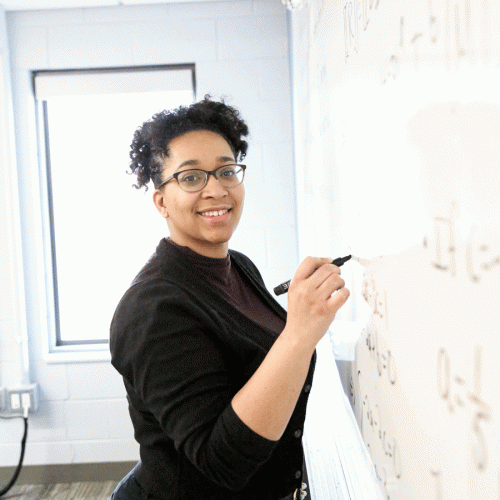The mathematical mind
Professor King teaches applied mathematics to solve real-world problems. Her research interests include applications of mathematics in image analysis and math education. Besides mathematics, her interests are broad and include a love for the arts: dance, music, and spoken word.
Knowing math is your passion

You know you’re a mathematician when … you enjoy problem-solving, with equations and variables, just for the sake of it. All those calculations that everyone else would prefer to do in the calculator, you like to do them by hand when you can. These are the early signs of a mathematician, since most math done in high school is focused on calculations.
Love of math itself
The first mathematicians didn’t have calculators and computers, so all computations were done by hand. Moreover, many of them were also philosophers, physicists, and astronomers. Mathematics, in context of a problem from another discipline, is applied mathematics. Another category is pure mathematics. This is mathematics where people study objects that are defined theoretically, outside the context of any particular application. Studying these objects is enjoyed for the love of math itself. Mathematicians, in essence, are logical, creative problem-solvers with the ability to think from the abstraction of definitions and theorems, rather than exclusively from physical realities.
Logical language
No one really knows what it is like to be a mathematician until you are in close proximity to research mathematicians and you’re able to get a glimpse into their world. I took the plunge into the deep end and went to graduate school, where I learned to ask questions that pry into the inner workings of the mathematical mind.
I would summarize the mathematicians’ skill set in three main points: we are able to calculate quickly; we figure out a logical path from beginning to end, correcting errors along the way; and we interpret mathematics as a logical language. Mathematicians read symbols like others read sentences, since the symbols have a context in the language and can be interpreted by that context. Moreover, it is very important that mathematicians are able to conclude when a statement, equation, or proof is logical. Without this skill, we are not able to apply mathematics to problems with accuracy and certainty.
Ask questions to develop skills
Most often, mathematicians start with examples of mathematical objects and ask questions about them. We obtain an understanding of how fundamental objects work, such as differential equations, manifolds, geodesics, Lie algebras, and other representations. I mention these theoretical objects, but consider as a simple example, the equation:
f(x)=ex
If someone were to ask, “What is this?,” a person familiar with this function may say an exponential function. A mathematician may respond:
it is a function whose derivative is one at x = 0,
a function whose derivative is itself,
a function with asymptotic behavior,
a function that solves a linear homogeneous differential equation,
a function whose base satisfies a limit relating to continuous compounding.
We know how to accurately describe this function just as an NBA player knows the weight, bounce, and aerodynamics of a standard league basketball. It is this deep level of understanding that excites mathematicians and compels us to either conduct research, teach it, or apply it to the pressing problems of today’s world.
This story is part of a series on six faculty who offer expertise on the fields they are passionate about teaching.



